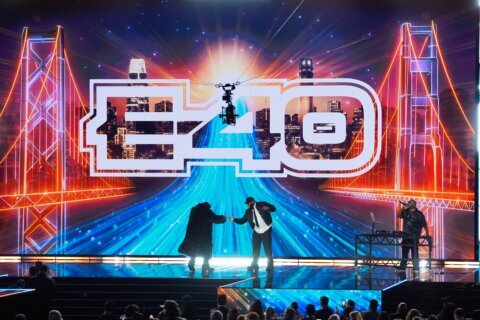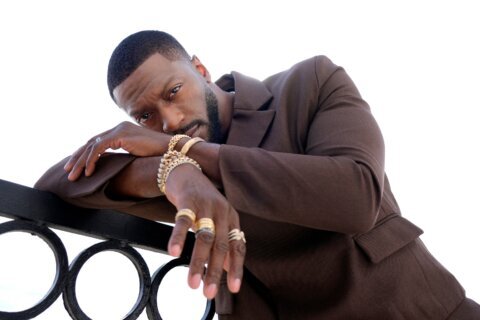WASHINGTON — How dare you remake a classic? When you dare to do it right, that’s how.
Long before the Oscar-winning “A Star is Born” (1976) with Barbra Streisand and Kris Kristofferson, Judy Garland and James Mason starred in George Cukor’s 1954 musical of the same name. Even that definitive take was a remake of William Wellman’s 1937 gem with Fredric March and Janet Gaynor, which was itself based on “What Price Hollywood?” (1932).
The point is, “A Star is Born” has become like “Romeo and Juliet” at this stage, a tragic tale reimagined countless times over the years. All we can do is judge each rendition on its own merits, of which there are many in Bradley Cooper’s sensational Oscar contender “A Star is Born.” As one character says, there’s only ever 12 notes; it’s how you play them that matters.
The basic premise is the same: established artist spirals into alcoholism while launching his new lover to rising stardom. This time, the established artist is country-rock singer Jackson Maine (Cooper), who drinks from a flask after every show. One night, he spots potential in bar singer Ally (Lady Gaga) and tries to launch her career. Of course, the two fall madly in love as star-crossed lovers whose career trajectories are tragically moving in opposite directions.
Cooper delivers what may be his finest performance after cracking us up in “Wedding Crashers” (2005) and “The Hangover” (2009), showing range in David O. Russell’s “Silver Linings Playbook” (2012) and “American Hustle” (2013), then turning serious for “American Sniper” (2014). In “A Star is Born,” he finds a gruff voice and surprising vocals, sharing touching scenes with Sam Elliott as his older brother and Dave Chappelle as his old pal.
Of course, the real star is Gaga, who is utterly unique to behold on screen. “Almost every single person has told me they like the way I sound, but that they didn’t like the way I look,” she says, pointing to her nose. Cooper replies, “I think you’re beautiful.” Ditto. Gaga is a refreshing presence, slaying us as soon as she opens her mouth to show off her pipes.
When it comes to her singing chops, I’ve been on the Gaga train for years. Doubters initially dismissed her as a pre-packaged pop star due to flamboyant outfits like the meat dress. I was hooked the second I saw her in person performing Sting’s “If I Ever Lose My Faith In You” at the Kennedy Center Honors, followed by a Grammy-winning jazz duet with Tony Bennett, an Oscar salute to “The Sound of Music” and one of the best ever Super Bowl Halftime Shows.
I suppose we should have seen her Hollywood leap coming, as “Bad Romance” deliciously referenced Hitchcock: “I want your Psycho, your Vertigo shtick, want you in my Rear Window, baby it’s sick.” Her journey in “A Star is Born” works because we watch Gaga come into her own as an actress just as her character comes into her own as a singer. We feel like we’re watching a star being born, marking growth from her role in TV’s “American Horror Story.”
Occasionally, she overacts in moments of rage, first in a public restroom after a breakup, then as she smashes frames of gold records off the wall. These blemishes are easy to forgive because she’s so damn convincing in her chemistry with Cooper, as well as interactions with her on-screen father (Andrew Dice Clay), who longs for his “better than Sinatra” glory days.
When the camera isn’t hovering over her shoulders thanks to cinematographer Matthew Libatique (“Black Swan”), Gaga often appears in giant close-ups, a throwback choice by Cooper, who directs with respect for past renditions. He salutes Streisand with the Fanny Brice casting of “Funny Girl” (1968) and nods to Wellman by having Cooper smash cake in Gaga’s face like James Cagney’s famous grapefruit to the face in “The Public Enemy” (1931).
Cooper’s best homage is to Garland, as Gaga sings the prelude to “Over the Rainbow” under the opening credits, where the title appears in a similar font as “La La Land” (2016). It’s one of many great soundtrack selections, mixing covers like “La Vie en Rose” with killer originals, from “Maybe It’s Time” (written by Grammy winner Jason Isbell) and the closing number “I’ll Never Love Again” (written by Gaga, Natalie Hemby, Hillary Lindsey and Aaron Raitiere).
It’s one of those haunting soundtracks that will loop in your head for weeks after you exit the movie theater, causing you buy the entire album and listen to it on repeat for years to come.
The real showstopper is “The Shallow,” both a nod to Mason’s tragic walk into the waves and a powerful anthem for Gaga to belt to the stadium crowd. Written by Gaga, Mark Ronson, Anthony Rossomando and Andrew Wyatt, the song will almost certainly win the Oscar, just like Garland’s Oscar-nominated “The Man That Got Away” and Streisand’s Oscar-winning “Evergreen,” voted the American Film Institute’s No. 11 and No. 16 Greatest Movie Songs.
In addition to the songs, Cooper makes clever use of the sound design, overpowering his protagonist with a cacophony of paparazzi chaos before suddenly cutting to silence. It’s an intentionally jarring motif maintained throughout to show the reprieve of solitude, which reflects his own real-life celebrity experience, Cooper said at the D.C. premiere (SPOILERS):
During the Q&A with AFI founder George Stevens Jr., I asked Cooper about his most masterful touch: fatalistic foreshadowing. Directors rule their on-screen universe, knowing what’s going to happen to the characters, so they can foreshadow the finale with visual symbolism. In this case, it’s an ominous background billboard of neon nooses the first time we see him sip his flask. Later, an underwater shot suggests he’s drowning (far from the “The Shallow”). Toward the end, he stands in front of vertical window blinds resembling jail bars (Gaga does not).
This fatalistic tone is also there in the script, which Cooper co-writes with Eric Roth (“Forrest Gump”) and Will Fetters (“The Best of Me”). You’ll notice that his early flirtatious line, “I just wanted to take another look at you,” returns later as a dialogue callback in their final scene together. Such full-circle moments keep viewers engaged even when the second half of Act Two threatens to sag because there’s so much symbolism hanging around the characters.
By the end, folks will bawl in the theater. You might manage to hold it together if you know where it’s headed from previous versions, but you’ll choke up thanks to Cooper’s nuanced approach to the emotional finale. I can only imagine how shocking it must be for first-timers.
Bring the tissues — you’re gonna need ’em.
Cooper may also need them to polish his awards, possibly an Oscar but definitely a Golden Globe, seeing as the latter has its own category for Best Comedy/Musical. Such acclaim would prove that this story is evergreen. To quote “Maybe It’s Time”: “It takes a lot to change, it takes a lot to try,” but when it comes to remakes, I’m glad Cooper didn’t let the old ways die.









